SEARCH BY TITLE
 Blessings of the Temple
Blessings of the Temple
As I think of temples, my thoughts turn to the many blessings we receive therein. As we enter through the doors of the temple, we leave behind us the distractions and confusion of the world. Inside this sacred sanctuary, we find beauty and order. There is rest for our souls and a respite from the cares of our lives. As we attend the temple, there can come to us a dimension of spirituality and a feeling of peace which will transcend any other feeling which could come into the human heart. We will grasp the true meaning of the words of the Savior when He said: “Peace I leave with you, my peace I give unto you. … Let not your heart be troubled, neither let it be afraid.” Such peace can permeate any heart—hearts that are troubled, hearts that are burdened down with grief, hearts that feel confusion, hearts that plead for help. . . My brothers and sisters, in our lives we will have temptations; we will have trials and challenges. As we go to the temple, as we remember the covenants we make there, we will be better able to overcome those temptations and to bear our trials. In the temple we can find peace. The blessings of the temple are priceless. One for which I am grateful every day of my life is that which my beloved wife, Frances, and I received as we knelt at a sacred altar and made covenants binding us together for all eternity. There is no blessing more precious to me than the peace and comfort I receive from the knowledge I have that she and I will be together again.
 Cairns on the Path of Mortality
Cairns on the Path of Mortality
There is power in the temple that gives each of us direction and dispels the feelings of being lost. Members of the Church and friends of other faiths come by the thousands to participate in temple open houses. Young children look to the temple as a place where they will one day marry for eternity. Worthy youth visit the temple to participate in the sacred ordinances of proxy baptism and confirmation. And worthy adults obtain their own endowments, are sealed, and perform these ordinances for those who are deceased and unable to perform them for themselves. The temple gives us direction by helping us set goals of staying or becoming worthy to enter the temple and perform sacred ordinances for ourselves and others. Brigham Young explained the importance of receiving these sacred ordinances. . . The temple stands as a cairn for all members of the Church. Worthy members of the Church should attend the temple in whatever capacity they are entitled. If members are not worthy to attend, they should take whatever measures are necessary to become worthy. As we attend the temple we will be blessed and gain the knowledge and testimony necessary to keep us on the path back to our heavenly home. In addition, we may receive personal revelations and inspirations that will not only help us reach our eternal goal but will make this life more bearable and enjoyable. Cairns are placed on trails to guide us across trail segments that are unclear and difficult to find. I have described three spiritual cairns today that can help guide you safely through mortality: scriptures, prophets, and temples. Keep in mind that while hiking you must actively seek out the next cairn—you cannot simply hope or wish to be further down the trail. You must walk, step, and strive. I challenge each of us to actively pursue spiritual cairns. Don’t simply read your scriptures—hold fast to them, search them, and use them in your life to solve problems and acquire answers. Follow the prophets, seek counsel from your parents, home teachers, bishops, and other local and general authorities. Sustain your leaders and help them perform their work by helping others understand the importance of their callings. Look to the temple, live worthily to enter its walls, attend often to perform sacred ordinances, and gain personal revelation and inspiration to assist you in reaching your mortal and eternal potential. Following these cairns will make your life here on earth easier and more fulfilling, and, most important, following them will help you stay on the eternal path that leads to your Father in Heaven.
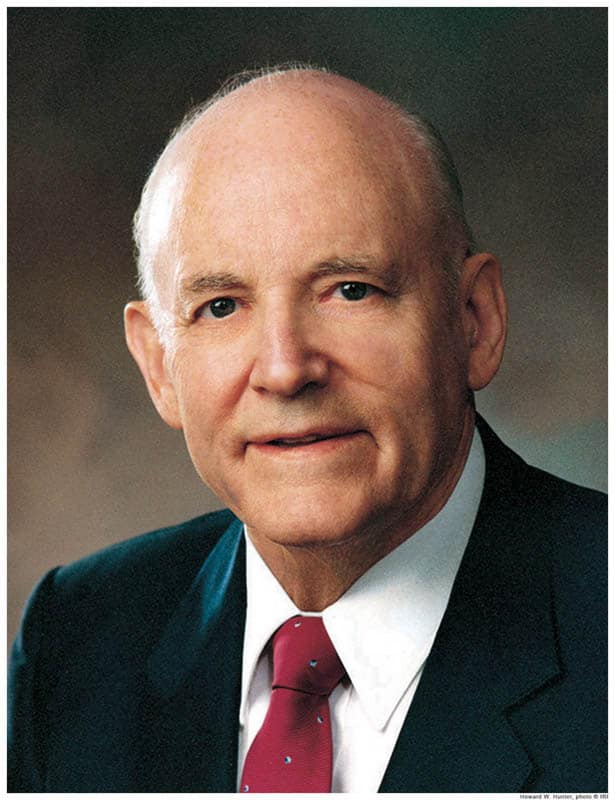 Follow the Son of God
Follow the Son of God
We are at a time in the history of the world and the growth of the Church when we must think more of holy things and act more like the Savior would expect his disciples to act. We should at every opportunity ask ourselves, “What would Jesus do?” and then act more courageously upon the answer. We must be about his work as he was about his Father’s. We should make every effort to become like Christ, the one perfect and sinless example this world has ever seen. And we again emphasize the personal blessings of temple worship and the sanctity and safety that are provided within those hallowed walls. It is the house of the Lord, a place of revelation and of peace. As we attend the temple, we learn more richly and deeply the purpose of life and the significance of the atoning sacrifice of the Lord Jesus Christ. Let us make the temple, with temple worship and temple covenants and temple marriage, our ultimate earthly goal and the supreme mortal experience. Let us share with our children the spiritual feelings we have in the temple. And let us teach them more earnestly and more comfortably the things we can appropriately say about the purposes of the house of the Lord. Let us prepare every missionary to go to the temple worthily and to make that experience an even greater highlight than receiving the mission call. Let us plan for and teach and plead with our children to marry in the house of the Lord. Let us reaffirm more vigorously than we ever have in the past that it does matter where you marry and by what authority you are pronounced man and wife. All of our efforts in proclaiming the gospel, perfecting the Saints, and redeeming the dead lead to the holy temple. This is because the temple ordinances are absolutely crucial; we cannot return to God’s presence without them. I encourage everyone to worthily attend the temple or to work toward the day when you can enter that holy house to receive your ordinances and covenants.
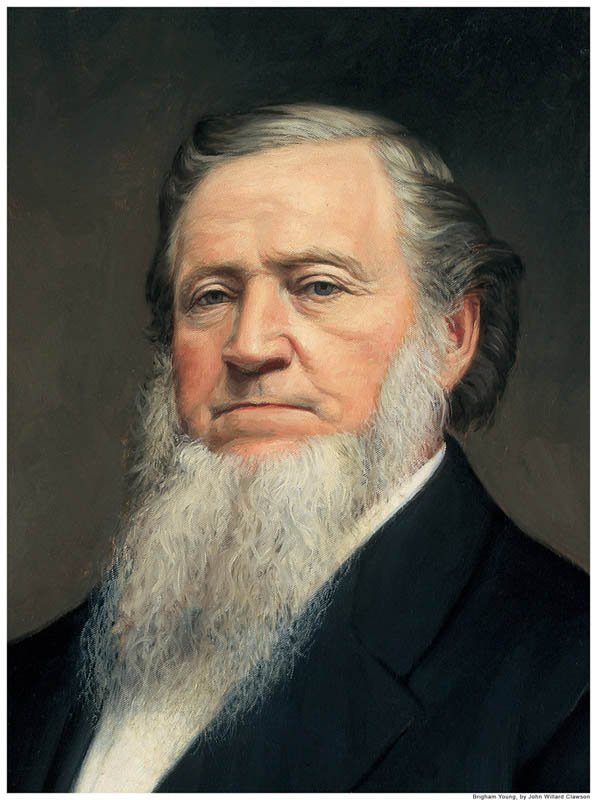 The Gospel of Jesus Christ
The Gospel of Jesus Christ
Let me say to you, if it is true that no man can enter the kingdom of God unless he is born of the water and of the Spirit, God must provide a plan by which those who have died ignorant of the Gospel may have the privilege of doing so, or he would appear to be a partial being. Has He provided that way? He has. The Christian world have taught, preached, contemplated, meditated, sung about and prayed for the Millennium. What are you going to do during that period, Christians? Do you know what the Millennium is for, and what work will have to be done during that period? Suppose the Christian world were now one in heart, faith, sentiment and works, so that the Lord could commence the Millennium in power and glory, do you know what would be done? Would you sit and sing yourselves away to everlasting bliss? No, I reckon not. I think there is a work to be done then which the whole world seems determined we shall not do. What is it? To build temples. We never yet commenced to lay the foundation of a temple but what all hell was in arms against us. That is the difficulty now: we have commenced the foundation of this temple. What are we going to do in these temples? Anything to be done there? Yes, and we will not wait for the Millennium and the fullness of the glory of God on the earth; we will commence, as soon as we have a temple, and work for the salvation of our forefathers; we will get their genealogies as far as we can. By and by, we shall get them perfect. In these temples we will officiate in the ordinances of the Gospel of Jesus Christ for our friends, for no man can enter the kingdom of God without being born of the water and of the Spirit.
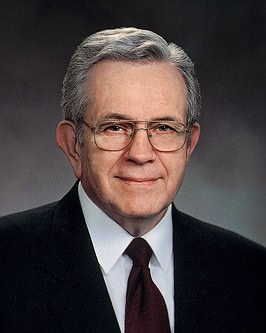 The Holy Temple
The Holy Temple
There are many reasons one should want to come to the temple. Even its external appearance seems to hint of its deeply spiritual purposes. This is much more evident within its walls. Over the door to the temple appears the tribute, “Holiness to the Lord.” When you enter any dedicated temple, you are in the house of the Lord. In the temples, members of the Church who make themselves eligible can participate in the most exalted of the redeeming ordinances that have been revealed to mankind. There, in a sacred ceremony, an individual may be washed and anointed and instructed and endowed and sealed. And when we have received these blessings for ourselves, we may officiate for those who have died without having had the same opportunity. In the temples sacred ordinances are performed for the living and for the dead alike. . . Sometimes our minds are so beset with problems, and there are so many things clamoring for attention at once that we just cannot think clearly and see clearly. At the temple the dust of distraction seems to settle out, the fog and the haze seem to lift, and we can “see” things that we were not able to see before and find a way through our troubles that we had not previously known. The Lord will bless us as we attend to the sacred ordinance work of the temples. Blessings there will not be limited to our temple service. We will be blessed in all of our affairs. No work is more of a protection to this church than temple work and the genealogical research that supports it. No work is more spiritually refining. No work we do gives us more power. No work requires a higher standard of righteousness. Our labors in the temple cover us with a shield and a protection, both individually and as a people. So come to the temple—come and claim your blessings. It is a sacred work.
 The Holy Temple – a Beacon to the World
The Holy Temple – a Beacon to the World
My brothers and sisters, temples are more than stone and mortar. They are filled with faith and fasting. They are built of trials and testimonies. They are sanctified by sacrifice and service. The first temple to be built in this dispensation was the temple at Kirtland, Ohio. The Saints at the time were impoverished, and yet the Lord had commanded that a temple be built, so build it they did. Wrote Elder Heber C. Kimball of the experience, “The Lord only knows the scenes of poverty, tribulation and distress which we passed through to accomplish it.” And then, after all that had been painstakingly completed, the Saints were forced to leave Ohio and their beloved temple. They eventually found refuge—although it would be temporary—on the banks of the Mississippi River in the state of Illinois. They named their settlement Nauvoo, and willing to give their all once again and with their faith intact, they erected another temple to their God. Persecutions raged, however, and with the Nauvoo Temple barely completed, they were driven from their homes once again, seeking refuge in a desert. The struggle and the sacrifice began once again as they labored for 40 years to erect the Salt Lake Temple, which stands majestically on the block just south of those of us who are here today in the Conference Center. Some degree of sacrifice has ever been associated with temple building and with temple attendance. Countless are those who have labored and struggled in order to obtain for themselves and for their families the blessings which are found in the temples of God. Why are so many willing to give so much in order to receive the blessings of the temple? Those who understand the eternal blessings which come from the temple know that no sacrifice is too great, no price too heavy, no struggle too difficult in order to receive those blessings. There are never too many miles to travel, too many obstacles to overcome, or too much discomfort to endure. They understand that the saving ordinances received in the temple that permit us to someday return to our Heavenly Father in an eternal family relationship and to be endowed with blessings and power from on high are worth every sacrifice and every effort.
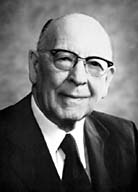 In the Mountain of the Lord’s House
In the Mountain of the Lord’s House
Isaiah saw our day. He saw the wilderness made to blossom as the rose. He saw the rivers flow in the desert where we have built these great irrigation canals under the inspiration of the Almighty, after our pioneers were led here to these valleys of the mountains, a wasteland, and nothing but their hands with which to labor, far away from transportation or commodities of any kind. He saw the waters flow down from the high places where it had been reservoired in these mountain fastnesses. He saw the daughters of Zion come up and sing in the heights of Zion. Where can you find anything in the history of this whole world to fulfill that like the singing of our Tabernacle Choir, singing now for over forty-two years without a break? Now with the Telstar, it is singing to the entire world. No wonder President Nixon said in his visit here last November that it was the greatest choir in all the world. Isaiah saw the mountain of the Lord’s house established in the top of the mountains in the latter days, and he named the latter days, when they would say: “Come ye, and let us go up to the mountain of the Lord, to the house of the God of Jacob; and he will teach us of his ways, and we will walk in his paths: for out of Zion shall go forth the law, and the word of the Lord from Jerusalem.” How literally that has been fulfilled, in my way of thinking, in this very house of the God of Jacob right here on this block! This temple, more than any other building of which we have any record, has brought people from every land to learn of his ways and walk in his paths.
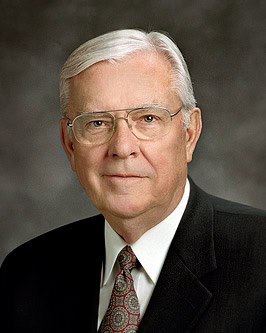 “Let Us Think Straight”
“Let Us Think Straight”
Elder Quentin L. Cook told about a life-changing role a stake Relief Society president had in Tonga. During a stake conference held while Elder Cook was there, the names of sixty-three prospective elders were sustained for ordination to the Melchizedek Priesthood. When Elder Cook asked how this “miracle” had been accomplished, the stake president told him that in a stake council meeting, the stake Relief Society president spoke of many men in their late twenties and early thirties who had not served missions and who were in various stages of activity. She suggested that the council focus on priesthood ordinations and temple ordinances for them as well as for their wives—some of whom were less active or not members. “As she spoke, the Spirit confirmed to the [stake] president that what she was suggesting was true,” Elder Cook related. It was decided that the men of the priesthood and the women of the Relief Society would reach out to rescue these men and their wives. . . . Those involved in the rescue focused primarily on preparing them for the priesthood, eternal marriage, and the saving ordinances of the temple. During the next two years, almost all of the 63 men who had been sustained to the Melchizedek Priesthood at the conference I attended were endowed in the temple and had their spouses sealed to them. This account is but one example of how critical our sisters are in the work of salvation.
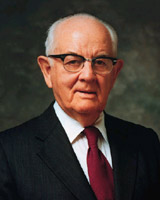 Marriage Is Honorable
Marriage Is Honorable
The day will come when there will be hundreds of temples all over this world, when there will not be a soul in the world, probably, who is more than a thousand miles away; and for a one-time experience in all one’s life, a thousand miles is not far to go. It wouldn’t be far to crawl if one knew what he was getting and what he was missing if he didn’t go. Remember, the temples of God are not for the vicarious temple ordinances for those who have known the gospel. I’m sure we misunderstand that. Those who live as you have lived for twenty years—as some of you will live for forty years and eighty years—this vicarious temple work isn’t for you. You do your work yourselves. That’s your job, to go up to the temple and get your endowments when you’re properly matured—your job, not your parents’ job or the responsibility of people after them, to give you blessings or even to open the door to blessings for you if you are not interested enough to get them for yourself. It’s for your grandfather and your great-great-grandparents and my great-great-grandparents. Those are the ones we go to the temple for. Those are the ones we do the work for, those who were born when there was no gospel on the earth, when there was no temple or idea of a temple. God is the God of the living, not the God of the dead. And people who close their eyes and their ears and fail to follow the commandments of God are dead. They’re dead as to all the things that are worthy: dead as to the benefits, dead as to the blessings, dead as to this natural and eternal gift. Temple sealings are for your ancestors, the people who could have traveled all over the world and never found a temple or a temple president or helpers to take them through and give them their endowments—people who were good, good as you and I are good, or better, and who may have neared perfection in their lives. But there were no temples; there were no temple workers. They had to wait. We must do their work for them. That’s why we have our genealogical work. That’s why we have the temple.
 Patience– A Heavenly Virtue
Patience– A Heavenly Virtue
I was touched by their sincerity. I was humbled by their poverty. They had so little. My heart filled with sorrow because they had no patriarch. They had no wards or stakes—just branches. They could not receive temple blessings—neither endowment nor sealing. No official visitor had come from Church headquarters in a long time. The members were forbidden to leave the country. Yet they trusted in the Lord with all their hearts, and they leaned not to their own understanding. In all their ways they acknowledged Him, and He directed their paths. I stood at the pulpit, and with tear-filled eyes and a voice choked with emotion, I made a promise to the people: “If you will remain true and faithful to the commandments of God, every blessing any member of the Church enjoys in any other country will be yours.” That night as I realized what I had promised, I dropped to my knees and prayed, “Heavenly Father, I’m on Thy errand; this is Thy church. I have spoken words that came not from me, but from Thee and Thy Son. Wilt Thou, therefore, fulfill the promise in the lives of this noble people.” There coursed through my mind the words from the psalm, “Be still, and know that I am God.” The heavenly virtue of patience was required. Little by little the promise was fulfilled. First, patriarchs were ordained, then lesson manuals produced. Wards were formed and stakes created. Chapels and stake centers were begun, completed, and dedicated. Then, miracle of miracles, a holy temple of God was permitted, designed, constructed, and dedicated. Finally, after an absence of fifty years, approval was granted for full-time missionaries to enter the nation and for local youth to serve elsewhere in the world. Then, like the wall of Jericho, the Berlin Wall crumbled, and freedom, with its attendant responsibilities, returned.
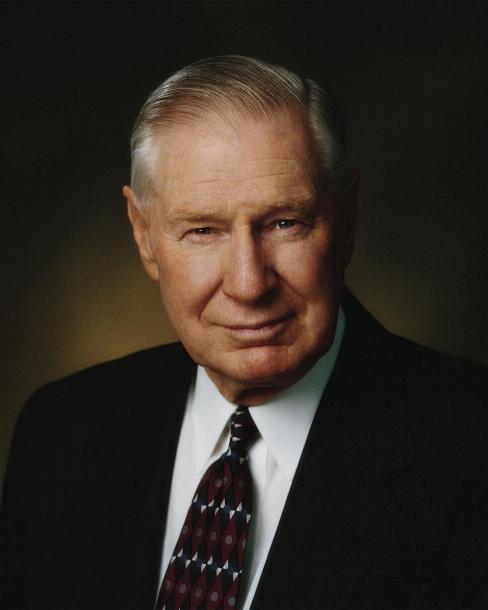 The Restoration of All Things
The Restoration of All Things
Through the earth’s long history, temple worship has been a significant part of the Saints’ worship, by which they show their desire to come closer to their Creator. The temple was a place of learning for the Savior when He was on the earth; it was very much a part of His life. Temple blessings are available once again in our day. A unique feature of The Church of Jesus Christ of Latter-day Saints is its teaching concerning temples and the eternal significance of all that occurs within them. Our majestic and beautiful temples now dot much of the earth. In them the most sacred work is done. President Gordon B. Hinckley has stated of these temples, “There are only a few places on earth where man’s questions about life receive the answers of eternity.” The solemn mysteries of where we came from, why we are here, and where we are going are answered more fully in the temples. We came from God’s presence and are here on earth to prepare to return to His presence. Of transcendent significance is that within the sacred walls of the temple, husbands and wives make eternal covenants. These covenants are sealed by priesthood authority. Children of that union, if they are worthy, may enjoy an eternal relationship as part of a family and as children of God. As the Apostle John wrote: “What are these which are arrayed in white robes? … Therefore are they before the throne of God, and serve him day and night in his temple.” The Lord has said that His work is “to bring to pass the immortality and eternal life of man.” It follows then that all mankind, living and dead, should have the opportunity of hearing the gospel either in this life or in the spirit world. As Paul said to the Corinthians, “Else what shall they do which are baptized for the dead, if the dead rise not at all? why are they then baptized for the dead?” This is the reason we do ordinance work in temples for our deceased ancestors. No person’s choice or agency is taken away. Those for whom the work is done may accept it or not, as they choose.
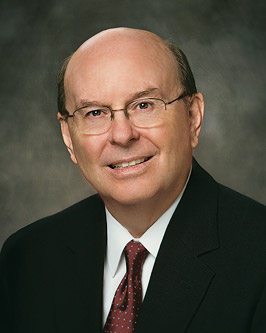 Roots and Branches
Roots and Branches
Wilford Woodruff indicated that the Prophet Joseph Smith lived long enough to lay the foundation for temple work. By the last time he, Joseph Smith, ever met with the Quorum of the Twelve, he had given them their endowments. After the Prophet’s martyrdom, the Saints completed the Nauvoo Temple, and the sealing power was used to bless thousands of faithful members before the exodus to the Mountain West. Thirty years later, at the completion of the St. George Temple, President Brigham Young noted the eternal significance of saving ordinances finally being available for both the living and the dead. This is simply stated by President Wilford Woodruff: “There is hardly any principle the Lord has revealed that I have rejoiced more in than in the redemption of our dead; that we will have our fathers, our mothers, our wives and our children with us in the family organization, in the morning of the first resurrection and in the Celestial Kingdom. These are grand principles. They are worth every sacrifice.”
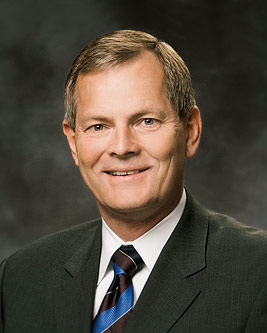 Sacred Homes, Sacred Temples
Sacred Homes, Sacred Temples
In order to keep the temple and those who attend it sacred and worthy, the Lord has established standards through His servants, the prophets. We may be well-advised to consider together, in family council, standards for our homes to keep them sacred and to allow them to be a “house of the Lord.” The admonition to “establish … a house of prayer, a house of fasting, a house of faith, a house of learning, a house of glory, a house of order, a house of God” provides divine insight into the type of home the Lord would have us build. Doing such begins the construction of a “spiritual mansion” in which we all may reside regardless of our worldly circumstance—a home filled with treasure that “neither moth nor rust doth corrupt.” There exists a righteous unity between the temple and the home. Understanding the eternal nature of the temple will draw you to your family; understanding the eternal nature of the family will draw you to the temple. President Howard W. Hunter stated, “In the ordinances of the temple, the foundations of the eternal family are sealed in place.” President Boyd K. Packer counseled: “Say the word temple. Say it quietly and reverently. Say it over and over again. Temple. Temple. Temple. Add the word holy. Holy Temple. Say it as though it were capitalized, no matter where it appears in the sentence. “Temple. One other word is equal in importance to a Latter-day Saint. Home. Put the words holy temple and home together, and you have described the house of the Lord!”
